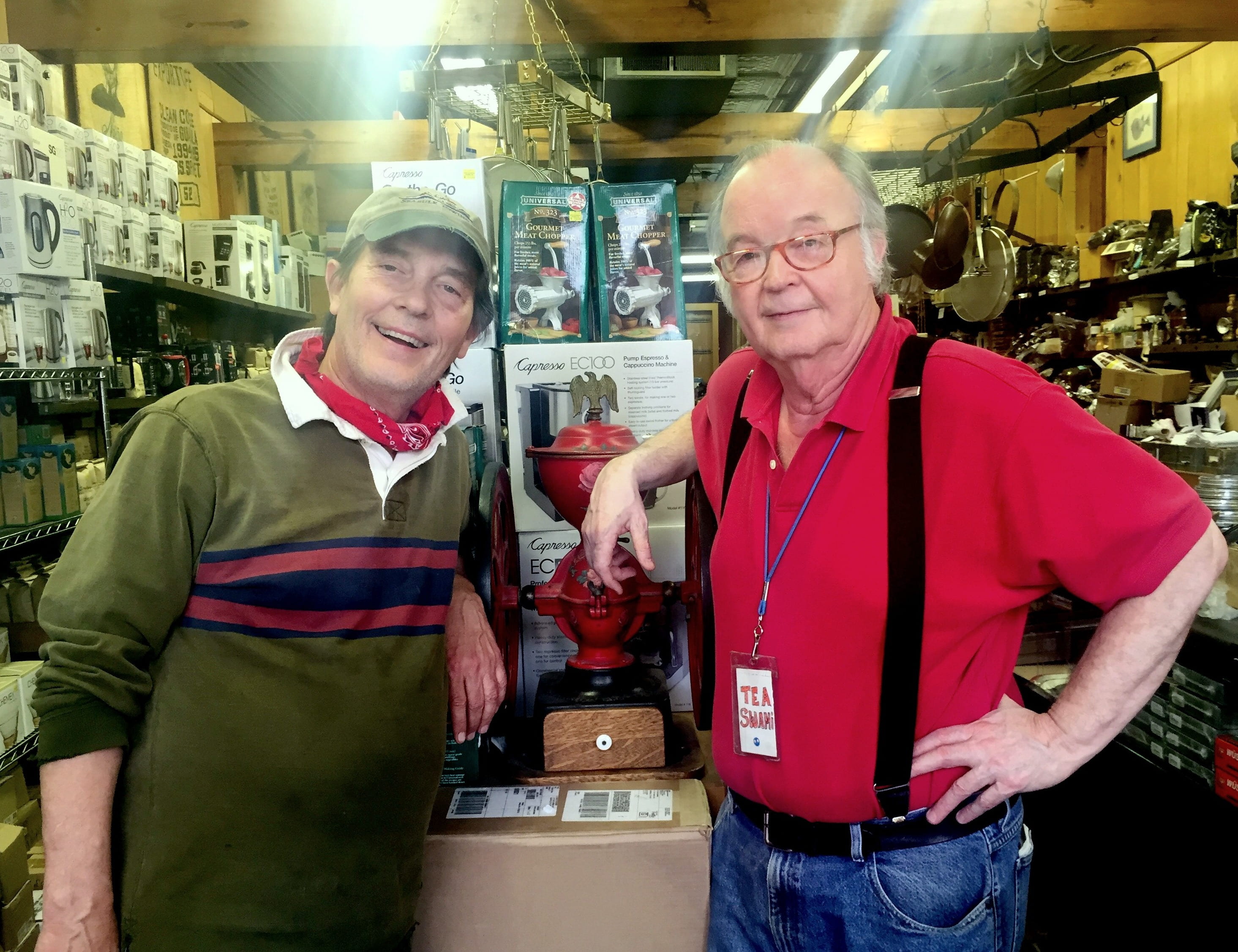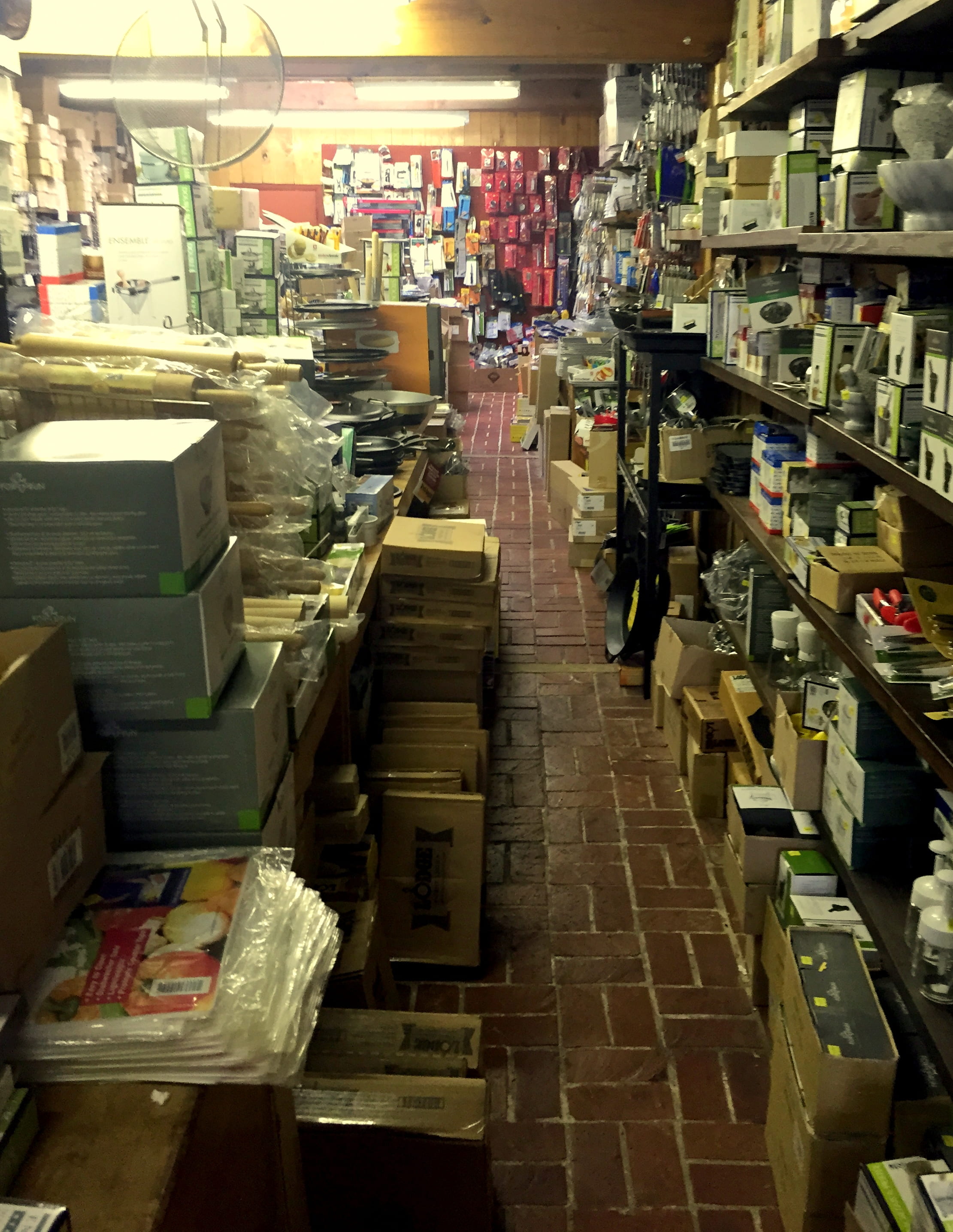Like a storage closet yet to be cleaned out, Davis Cookware and Cutlery may seem overwhelming at first. I find myself mindlessly wandering among the seemingly endless supply of cookware, bags of coffee and tea.
Stacked cardboard boxes hide any trace of a wall and various kitchen gadgets lay in their original shipping boxes.
The cluttered, anxiety-provoking display echoes the minds of the three men who spend nearly every day working in the shop. Ted Davis III along with his brother and father sit unfazed by the disorder, but if asked, they will tell customers the location and price of every product they sell. If asked about anything else, their answers become much less concise.
“You alright with getting too much sugar for a nickel?” said Ted’s brother, John Davis, in a warning that in my interview with Ted, I might get more answers than expected.
In my conversation with Ted, I learned about the gentrification of Nashville, the production of tea in China and countless pieces of wisdom I won’t soon forget.
Ted spends most days listening to NPR, working in the shop, talking to customers and researching anything and everything. He loves learning more than most. Ted’s father clearly knows the brilliance of his son as he cuts in to tell me of it.
“Finding him is like finding the encyclopedia and then turning around and finding the Internet. He just likes to learn” said Ted Davis II, Ted’s 86-year-old father.
“Hey John? I’m doing an interview so talk a little soft back there,” the younger Ted tells John.
“OK, Ted. I’ll keep it down,” John yells to Ted to taunt him.

Ted pays no mind to his brother who likes to push his buttons. Interviewing Ted with his brother and father talking nearby, I began to feel as though I came to visit relatives.
With every customer who walks in, the family is always prepared to strike up a conversation to make them feel at home.
The family’s late matriarch clearly made an impact on her husband and five sons with her sociable demeanor and eagerness to contribute to her community.
The shop stemmed from her idea to open a needlework shop which the town lacked at the time. Over the years, the shop’s focus slowly changed from needlework to cookware as a result of the men’s influence.
Ted started working for his family in his late teens. Once he started college, he worked in the shop by day and went to class at night. While simultaneously receiving his formal education, Ted explored his passions for tea and conversation by working in the shop.
Ted named himself “Tea Swami” or “master of tea” as he loves talking to his customers about tea, namely pu-erh, a less bitter version of a black tea. His name-tag says “To brew is human; pu-erh, divine” which combines poet Alexander Pope’s words, “To err is human; to forgive, divine,” with his favorite type of tea.
From working in the same place for most of his life and with talking to countless customers over the years, Ted’s wisdom reflects the camaraderie and knowledge of the people of Nashville. He gains just as much from his customers as they do from him.
“I look forward to getting those golden moments of illumination from normal people who walk in here,” said the younger Ted.
Hillsboro Village remains the shop’s longtime home. Originally, it stood where the restaurant Jackson’s now stands, then it moved across the street to Pangaea’s location. It relocated to its current location, between the current Pangaea and BookManBookWoman, in 1976.
Asking Ted of the changes Hillsboro Village has seen, it becomes clear to me how much modification the shop resisted over the years. Although almost every shop within a few miles of their shop drastically changed as a result of the boom of the early and mid-2000s, it managed to secure a spot.
I would expect for a small cookware shop in the middle of Nashville to have been turned into a sports bar by now. Small and family-owned businesses all over Nashville seem to close nearly every day. However, by renting its property for either shops nearby, they have found a way to stay in business.

The Davis family does not seem to think about making a profit off of the cookware shop. They know it does not make very much money, but they work to stay in business for more honorable reasons.
“We want people to spend their money wisely in our store. Our average customer will only spend about $1,000 in this store in their lifetime,” said Ted. “People who go to cafés spend $10 a day there and have nothing to show for it. They don’t have any friends there and no conversations were had there.”
Because of their ability to create and maintain connections with their customers, the Davis family’s roots are now deeply embedded in Nashville.
“My mom’s dying words to me were ‘Keep your dad at work and take care of your brothers,’” said Ted. “She would be proud letting the guys take over and for it to still be honorable.”
Ted continues to obey his mother’s request with John, his father and himself spending every day working with one another and keeping the family business running.
They still view Nashville as a small town where everybody knows everybody. Ted sees the cookware he sells in the shop and his conversations as a way of serving and participating in his community.
“This whole business started because my mom was a hard-working, sweet woman,” said Ted. “Because of that, we want to continue her legacy with products that are as safe as we can expect them to be. They’re shared in families, hopefully together during dinnertime.”
With their carefully selected products, the Davis family’s love for this community will always be present in something even as simple as a piece of cookware. Despite the changes Nashville will see in the coming years, its residents can depend on Davis Cookware and Cutlery to maintain its small-town character.
The Davis family and their shop remains as one of the final pieces of Nashville that keeps it grounded.
“The village is completely different except for this store. It’s exactly the same as it was in 1976. Although, it may be messier,” jokes Ted. “Under the circumstances, we did good.”